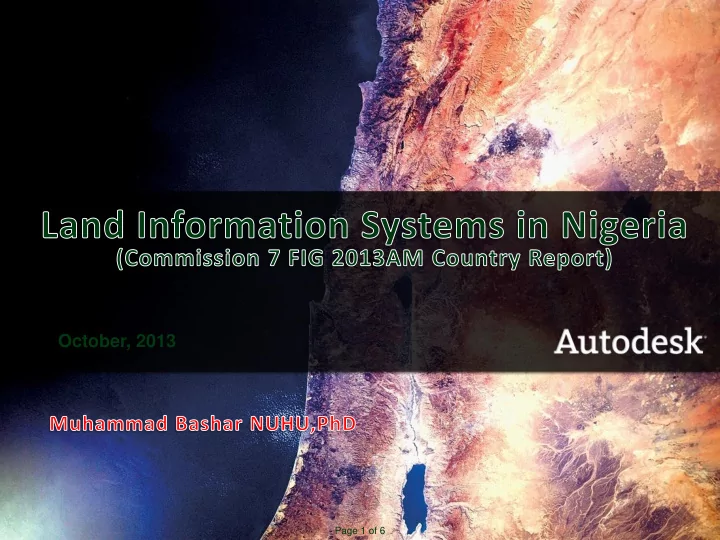

October, 2013 Page 1 of 6
o Nigeria is endowed with a vast expanse of land measuring 923,768 square kilometers and an estimated population of almost 150 million with an annual population growth rate of 2.50%. o A characteristic feature of this population growth has been the ever increasing rate of rural-urban migration.
CHALLENGES IN LAND INFORMATION SYSTEM IN NIGERIA o From pre-colonial era to the inception of Land Use Act Cap 5 of 2004 in Nigeria, land information still remains complex and diverse inspite of positive plethora of legislations such as : the Land and Native Rights Proclamation Law of 1910; State Lands Act Cap 45 of the Laws of the federation of Nigeria and Lagos; Crown Land Law of Western Nigeria; the Land Tenure Law of 1962; Registration Land Act of 1965; Public Land Acquisition Miscellaneous Provision Decree 33 of 1976 and Federal Lands Registry (Miscellaneous Provision) Decree No.7 of 1992)
LAPS – Land and Property System Present Experience in Nigeria LAPS was implemented in the following States in Nigeria: ● Bayelsa ● Plateau ● Niger ● Benue ● Kwara ● Nasarawa ● Bauchi ● Lagos ● Rivers Oct 2010 - Commissioning of PLAGIS by President Goodluck Each project included implementation of: ● Network and satellite internet ● Hardware installation ● Customized LAPS software ● Data gathering and processing ● Training, support and maintenance Oct 2011 - Commissioning of NIGIS by President Goodluck
Background “ 30% of a developed country economy is based on real- estate transactions” (Source – world bank) Land titling and registration unlock DEAD CAPITAL in land Our target - To guarantee title to land and engender confident market transactions in landed properties
LAPS highlights • LAPS can issue New Titles , process Re-Certification of Existing Titles and handle Sub-Transactions such as Sub-Lease, Assignment, Mortgage etc. • The system enables easy Storage , Retrieval and Processing of titles. Auditing and accounting Reports can automatically be generated and Legal Searches can easily be conducted • A GIS (Geographic Information System) integrated module enables linkage between the Geographical plot of land boundaries and its ownership information • Advanced billing module provides an intuitive tool to manage all land related financial transactions • LAPS is the only system in Nigeria which was implemented both in Federal level (FELIS) and in 9 States so far: Kaduna, Benue, Kwara, Plateau, Nasarawa , Niger,Bauchi,Bayelsa, etc
System benefits • Support resolution of land disputes and encroachments which were normally resort in legal disputes in the past • Increase the state revenue generation • Boost the economy for both banks and individuals through mortgage and real-estate loans • Speed-up the process of land related transactions • Support town planning, development control and industrial development
Challenges for best practice • Implementation: fear of change, acceptance of computerized systems, definition of new roles and taking ownership on the system and content • Build citizens trust • Internally Generated Revenue (IGR) – debt collection • Legal Framework – traditional rulers cooperation • Infrastructure – Internet and electricity • R&D – flexible design to fit Nigeria requirements • Manpower and capacity building – Handing over to operations, Motivation plans! • PPP model – Maintenance & support
o The LAND SWAP initiative involves the ceding of some proportion of land to investors for the purpose of providing infrastructural for the benefit of the people: Restricted only to the FCT; Under the initiative, 3302.49 hectares of land is expected to be seen as a chattel for infrastructural development in 23 districts in the FCT.
o The land swap is nevertheless without its bottlenecks: Force eviction; Compulsory resettlement; Unjust compensation. o The envisaged benefits of this swap initiative are: To fast track infrastructural provision and wade-off the pressure on public utilities and housing precipitated by alarming population growth; To fast track infrastructural provision and wade-off the pressure on public utilities and housing precipitated by alarming population growth;
The distributional objectives of the land swap in terms of profit sharing between the investors and government (60:40 basis); Unlocking dead capital by freeing up lands for development; Reduction in governmental budgetary spending on public infrastructure in the FCT.
Summary Land registration is a basic element in the foundation of a state/country. computerization of the Land Registry and titling process has a major role in creating a unified and harmonized land depository at both the state and nation levels.
THANK YOU
Recommend
More recommend